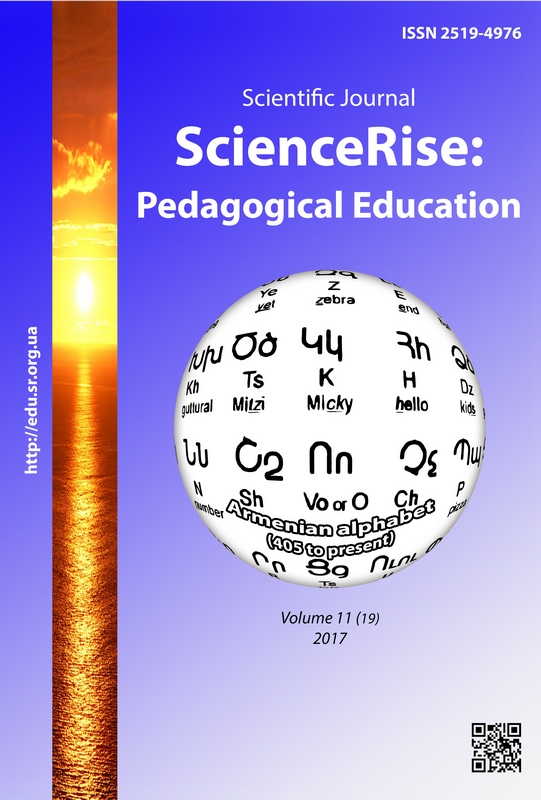Integrated content of future owners 'communicative competence
DOI:
https://doi.org/10.15587/2519-4984.2017.116815Keywords:
competence approach, communicative competence, future lawyers, integrative essence, integrative technologiesAbstract
In the article systematic analysis of scientific works on the problems of the preparation of future lawyers, the content and features of legal activity, the essence of the communicative competence of specialists of various fields. The research determines that the communicative competence of future lawyers is integrative professionally determined and personally significant values, knowledge, skills and qualities of lawyers, which ensure effective interaction in professional activities and the most complete self-realization in it.
The communicative competence of future lawyers has an integrative content, because it combines the use of the language system, but also the social phenomenon that functions along with other types of human activity. Today, the modern law specialist works in different socio-economic conditions with representatives of various professional communities and cultures, which allows to highlight communicative competence as one of the main and in vocational education, and in the field of knowledge 08- right.
The means of realizing the formation of communicative competence of future lawyers should be the creation and holding of special courses and special seminars of integrative content, which combine language, legal, cultural, pedagogical, and social components of educational plans. Among the conditions for the formation of the communicative competence of future lawyers, the creation of an integrated educational environment, a combination of traditional and innovative teaching technologies, the use of multimedia and other technical means, an increase in the role of independent work and the number of educational and research laboratories and training audiences are identified
References
- Baydenko, V. I. (Ed.) (2006). Bolonskiy protsess: poisk obshhnosti evropeyskikh sistem vysshego obrazovaniya (proekt TUNING) [The Bologna process: the search for a common European system of higher education (the TUNING project)]. Moscow: Issledovatel'skiy tsentr problem kachestva podgotovki spetsialistov, 211.
- Zhelnova, O. O. (2011). Formirovanie professional'no-kommunikativnoy kompetentnosti budushhikh yuristov v usloviyakh srednego professional'nogo uchenogo zavedeniya [Formation of professional and communicative competence of future lawyers in the conditions of an average professional academic institution]. Moscow, 25.
- Nikolashkina, V. E. (2017). Razvitie professional'noy-kommunikativnoy kompetentnosti budushhikh bakalavrov yurisprudentsii v sotsiokul'turnoy obrazovatel'noy srede vuza [Development of professional-communicative competence of future bachelors of jurisprudence in the sociocultural educational environment of the university]. Velikiy Novgorod, 25.
- Boeva, M. V. (2002). Taktiko-komunnikativnaya kompetentnost' sledovatelya (na primere vzaimodeystviya s obvinyaeym v konfliktnoy situatsii rozsledovaniya) [Taktiko-communal competence of the trainer (on the example of interaction with the prosecution in the conflict situation)]. Voronezh, 25.
- Yavorska, H. Kh., Trehubenko, T. V. (2012). Profesiina kompetentnist maibutnikh dilnychnykh inspektoriv militsii [Professional competence of future district police inspectors]. Odessa: Bukaiev V. V., 140.
- Kalyta, O. P. (2012). Mova yak ratsionalna diia v systemi formuvannia komunikatyvnoi kompetentnosti yurysta. Available at: https://www.narodnaosvita.kiev.ua/Narodna_osvita/vupysku/18/statti/kaluta.htm
- Proekt Tiuninh: vstupne slovo. Available at: http://pca.com.ua/navchannya/proekt-tyuning-formuvannya-yedinogo-yevropejskogo-standartu-vishhoyi-osviti/
- Bruner, Dzh. (2006). Kul'tura obrazovaniya [Culture of Education] Moscow: Prosveshchenie, 223.
- Shherba, L. V. (2004). Yazykovaya sistema i rechevaya deyatel'nost [Language system and speech activity]. Moscow: Yeditori URSS, 432.
- Leont'ev, A. A. (2003). Yazyk i rechevaya deyatel'nost' v obshhey i pedagogicheskoy psikhologii. Izbrannye psikhologicheskie trudy [Language and speech activity in general and pedagogical psychology. Selected psychological works]. Moscow, 536.
- Usmanova, O. F. (2005). Rechevaya kommunikatsiya v yuridichiskoy praktike [Speech communication in law practice]. Nizhny Novgorod, 25.
- Sikorska, L. B. (2011). Zmist komunikatyvnoi kompetentnosti pratsivnykiv OVS ta yii rozvytok [Content of the communicative competence of ATS employees and its development]. Naukovyy visnyk L'vivs'koho derzhavnoho universytetu vnutrishnikh sprav, 1, 106–119.
- Kozhemiako, N. V. (2015). Formuvannia komunikatyvnoi kompetentnosti molodshykh spetsialistiv z pravoznavstva u protsesi vyvchennia psykholoho-pedahohichnykh dystsyplin [Formation of communicative competence of junior lawyers in the process of studying psychological and pedagogical disciplines]. Kyiv, 250.
- Liashenko, I. V. (2014). Komponentnyi analiz komunikatyvnoi kompetentsii maibutnikh yurystiv. Visnyk Natsionalnoi akademii Derzhavnoi prykordonnoi sluzhby Ukrainy, 1. Available at: http://irbis-nbuv.gov.ua/cgi-bin/irbis_nbuv/cgiirbis_64.exe
- Bovdyr, O. B. (2015). Komunikatyvna kompetentnist studentiv yurydychnykh spetsialno spetsialnostei: zmist ta struktura. Naukovi zapysky. Seriia: Pedahohichni nauky, 135, 61–63.
- Marchenko, Yu. H. (2009). Komunikatyvna kompetentnist yak odna z kliuchovykh kompetentnostei maibutnoho yurysta [Communicative competence as one of the key competences of the future lawyer]. Naukovi pratsi. Seriya: Pedahohika, psykholohiya i sotsiolohiya, 5/1 (155), 183–187.
- Bilonozhko, A. V. (2008). Sotsialno-psykholohichni chynnyky stanovlennia komunikatyvnoi kultury maibutnoho yurysta v protsesi profesiinoi pidhotovky [Socio-psychological factors of formation of the communicative culture of the future lawyer in the process of professional training]. Kyiv, 21.
Downloads
Published
How to Cite
Issue
Section
License
Copyright (c) 2017 Оlga Yuhymets

This work is licensed under a Creative Commons Attribution 4.0 International License.
Our journal abides by the Creative Commons CC BY copyright rights and permissions for open access journals.
Authors, who are published in this journal, agree to the following conditions:
1. The authors reserve the right to authorship of the work and pass the first publication right of this work to the journal under the terms of a Creative Commons CC BY, which allows others to freely distribute the published research with the obligatory reference to the authors of the original work and the first publication of the work in this journal.
2. The authors have the right to conclude separate supplement agreements that relate to non-exclusive work distribution in the form in which it has been published by the journal (for example, to upload the work to the online storage of the journal or publish it as part of a monograph), provided that the reference to the first publication of the work in this journal is included.







